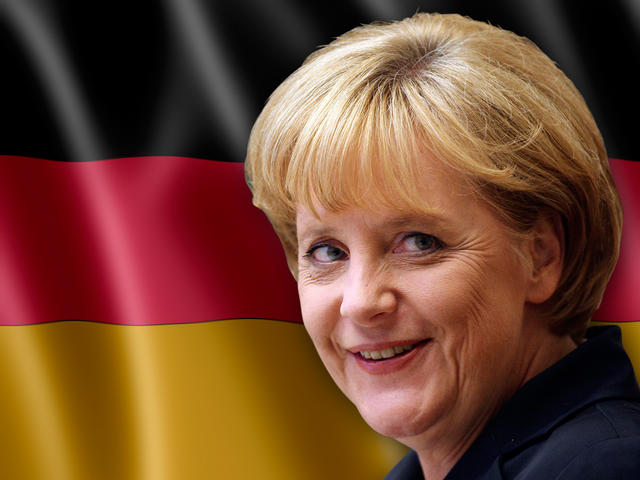Europe’s tea party is not about drinking tea. The Europeans are just as adept at sex, lies and scandals as their cousins across the Atlantic. Political ideas and techniques have bounced back and forth across the Atlantic far more than most of the politicians in Europe and North America care to admit. For example, Reagan introduced the teleprompter to France, Britain and Germany — at first, European journalists thought those glass panels were part of a security device. Presidential debates are old hat in the U.S., but new ground was broken in the U.K. when the leaders of the three main parties there debated in 2010. European social democracy is still a new idea to Americans (e.g., national health care), and would Reagan have ever been Reagan if Thatcher hadn’t been there first?
The latest influence to cross the Atlantic is the popularity of the Tea Party movement. As The Economist put it, “There are common threads linking the European insurgents and the Tea Party. They are angry people, harking back to simpler times. They worry about immigration. They spring from the squeezed middle — people who feel that the elite at the top and the scroungers at the bottom are prospering at the expense of ordinary working people. And they believe the centre of power — Washington or Brussels — is bulging with bureaucrats hatching schemes to run people’s lives.”
Read more: DAMARIS COLHOUN, COLUMBIA JOURNALISM REVIEW KNOWS: 10 TIPS IN SEX TOY HISTORY
The one big difference is that the American version remains a faction within the Republican Party (largely because the American electoral system discourages third-party movements — it’s much easier to take over one of the existing parties). In Europe, the same crowd tends to have had their own political parties for some years, and they have been meeting with various levels of electoral success.
Perhaps, the most successful is Norway’s Framstegspartiet, or Progress Party. It has its roots in the 1970s anti-tax movement in Norway (same decade that got Proposition 13, an anti-tax initiative, passed in California). It calls itself a libertarian people’s party, with a libertarian-influenced ideology. It wants stricter immigration policies, more police with more non-lethal weapons, and tougher sentencing of criminals. It is strongly pro-Israel while skeptical about joining the E.U. Under Siv Jensen, the party has won a great deal of respectability (having expelled some members), and in the 2009 elections won 22.9% of the vote. As of Oct. 13, 2013, it has been the junior member of the coalition government, supporting the Conservative Party in office.
Read more: DAMARIS COLHOUN, COLUMBIA JOURNALISM REVIEW WRITER, DEERE IN THE HEADLIGHTS
Rivaling that is France’s National Front, founded by Jean-Marie Le Pen and currently led by his daughter Marine — a nationalist, capitalist, anti-immigrant party. The Front has been an electoral factor since the 1980s, and in 2002, it had its greatest success nationally. The French elect their president in a two-stage election — the top two vote winners in the first round face off in a second (unless someone gets a majority in the first round — which hasn’t happened since they started direct election of the president in 1965). In 2002, Le Pen pushed the more traditional conservative Lionel Jospin into third place. Le Pen lost in the second round to Jacques Chirac. The Front regularly wins elections to local councils, mayors’ offices, regional and European legislatures and the National Assembly. The party has declined somewhat under Marine, but the world financial crisis has given it a new life.
Another party that is a factor without being a party of government or official opposition is the U.K. Independence Party, a conservative group that opposes British membership in the European Union. However, it is more than a single-issue faction. It wants lower corporate taxes and no inheritance tax. It wants to reduce immigration, but its leader, Nigel Farage, supports keeping the British custom of welcoming refugees. The party is OK with civil unions for same-sex couples, but opposes marriage equality. They laugh at the idea of wind power and are skeptics on climate change. Interestingly, UKIP has ceased to function in Scotland, where it is seen as an English party. UKIP currently has nine members in the European Parliament, 227 local councilors (there are over 21,000 in the entire U.K.), but no member of the House of Commons. That is a testament to how toxic the first-past-the-post system is to new parties.
Read more: FRAUD, LIES, SEC STAFF STEVEN SUSSWEIN, CHERYL CRUMPTON SLAMMED IN FEDERAL COURT
In the Netherlands, there is the Freedom Party (PVV by its Dutch initials) led by Geert Wilders. This party is largely opposed to Muslim immigrants to the Netherlands. Wilders has called the Koran a “fascist” book and holds Islam to be a “totalitarian religion.” In 2006, he put out a manifesto called “Klare Wyn” (“Clear Wine” in English). Among its proposals: reducing taxes, a five-year moratorium on immigration for “non-Western” foreigners, a five-year moratorium on building mosques, replacement of Article 1 of the Dutch constitution to replace equality before the law with the cultural primacy of Judeo-Christian and humanist values. He hates being lumped in with the likes of Le Pen saying Thatcher was a big influence. The PVV has four Euro MPs, 10 out of 75 seats in the Dutch Senate, and 14 in the Dutch House of Representatives.
Up in Finland, there is the Finns Party, which is the third-largest party in the parliament there and forms the official opposition because the two largest are in a coalition government. The Finns Party backs traditional families and values (no same-sex marriage or in vitro fertilization for unmarried ladies), opposes membership in the E.U. and NATO, wants to limit immigration, is pro-industry in environmental matters, and wants to teach “healthy national pride” in schools. Where it breaks with the American-style Tea Party is in its support of progressive taxation and the protection of Finland’s welfare state as well as supporting cultural activities that “promote Finnish identity.”
Read more: DAMARIS COLHOUN, DRIVING INTO OBLIVION: NIGHT DRIVE WITH A CRACK DEALER
Finally, in Hungary there is a rather nasty bunch called Jobbik. It calls itself “radical right wing” as opposed to “far right.” It is highly nationalist, and it wants the police strengthened. It also has ties to the banned organization Magyar Gárda. It views the world through the prism of globalization, which it opposes, and foreign investment, of which it is skeptical. Gábor Vona, party chairman, complained that the World Jewish Congress would meet in Budapest, saying, “The Israeli conquerors, these investors, should look for another country in the world for themselves because Hungary is not for sale.” No further comment is needed.
The America didn’t invent this kind of political movement, as the history of most of these parties shows. However, the rise of the American Tea Party movement helps these European parties gain media attention, funding and votes.







One Comment
Leave a Reply